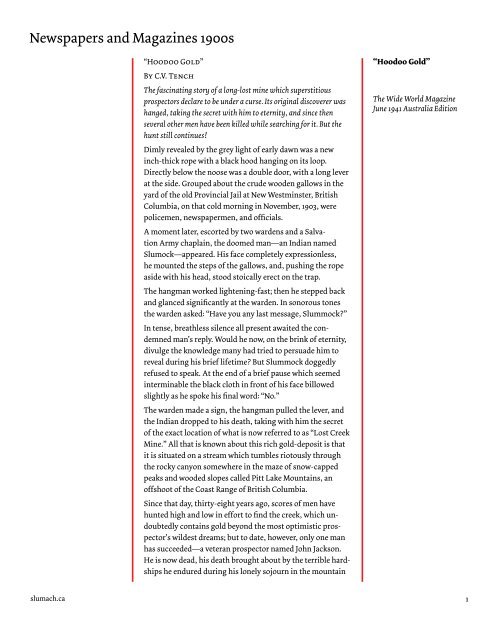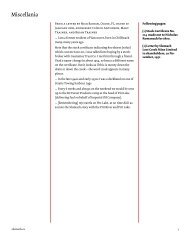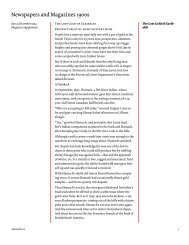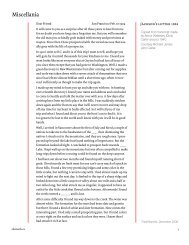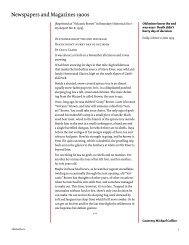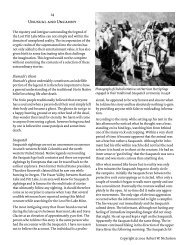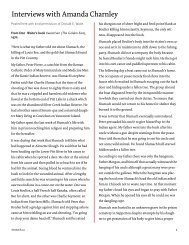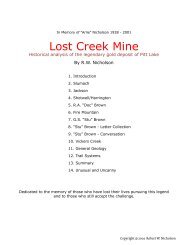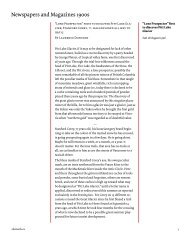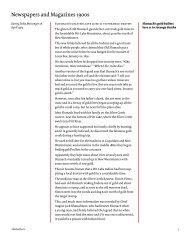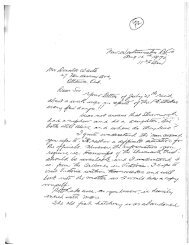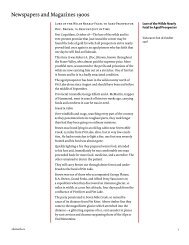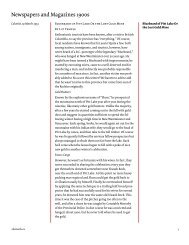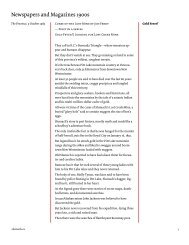Hoodoo Gold, by C.V. Tench, The Wide World Magazine ... - Slumach
Hoodoo Gold, by C.V. Tench, The Wide World Magazine ... - Slumach
Hoodoo Gold, by C.V. Tench, The Wide World Magazine ... - Slumach
Create successful ePaper yourself
Turn your PDF publications into a flip-book with our unique Google optimized e-Paper software.
Newspapers and <strong>Magazine</strong>s 1900s<br />
“<strong>Hoodoo</strong> <strong>Gold</strong>”<br />
By C.V. <strong>Tench</strong><br />
<strong>The</strong> fascinating story of a long-lost mine which superstitious<br />
prospectors declare to be under a curse. Its original discoverer was<br />
hanged, taking the secret with him to eternity, and since then<br />
several other men have been killed while searching for it. But the<br />
hunt still continues!<br />
Dimly revealed <strong>by</strong> the grey light of early dawn was a new<br />
inch-thick rope with a black hood hanging on its loop.<br />
Directly below the noose was a double door, with a long lever<br />
at the side. Grouped about the crude wooden gallows in the<br />
yard of the old Provincial Jail at New Westminster, British<br />
Columbia, on that cold morning in November, 1903, were<br />
policemen, newspapermen, and officials.<br />
A moment later, escorted <strong>by</strong> two wardens and a Salvation<br />
Army chaplain, the doomed man—an Indian named<br />
Slumock—appeared. His face completely expressionless,<br />
he mounted the steps of the gallows, and, pushing the rope<br />
aside with his head, stood stoically erect on the trap.<br />
<strong>The</strong> hangman worked lightening-fast; then he stepped back<br />
and glanced significantly at the warden. In sonorous tones<br />
the warden asked: “Have you any last message, Slummock”<br />
In tense, breathless silence all present awaited the condemned<br />
man’s reply. Would he now, on the brink of eternity,<br />
divulge the knowledge many had tried to persuade him to<br />
reveal during his brief lifetime But Slummock doggedly<br />
refused to speak. At the end of a brief pause which seemed<br />
interminable the black cloth in front of his face billowed<br />
slightly as he spoke his final word: “No.”<br />
<strong>The</strong> warden made a sign, the hangman pulled the lever, and<br />
the Indian dropped to his death, taking with him the secret<br />
of the exact location of what is now referred to as “Lost Creek<br />
Mine.” All that is known about this rich gold-deposit is that<br />
it is situated on a stream which tumbles riotously through<br />
the rocky canyon somewhere in the maze of snow-capped<br />
peaks and wooded slopes called Pitt Lake Mountains, an<br />
offshoot of the Coast Range of British Columbia.<br />
Since that day, thirty-eight years ago, scores of men have<br />
hunted high and low in effort to find the creek, which undoubtedly<br />
contains gold beyond the most optimistic prospector’s<br />
wildest dreams; but to date, however, only one man<br />
has succeeded—a veteran prospector named John Jackson.<br />
He is now dead, his death brought about <strong>by</strong> the terrible hardships<br />
he endured during his lonely sojourn in the mountain<br />
“<strong>Hoodoo</strong> <strong>Gold</strong>”<br />
<strong>The</strong> <strong>Wide</strong> <strong>World</strong> <strong>Magazine</strong><br />
June 1941 Australia Edition<br />
slumach.ca<br />
1
Newspapers and <strong>Magazine</strong>s 1900s<br />
wilderness.<br />
Before Jackson died he wrote a lengthy letter and drew a<br />
rough map showing the position of Lost Creek. His statement<br />
proved beyond doubt the truth of what Slummock had<br />
often boasted in his cups—that the banks of this watercourse<br />
are literally lined with gold that can be gathered in handfuls<br />
in pieces as large as walnuts! Owing to Jackson’s story, the<br />
lure of Lost Creek continues to appeal to men who are not<br />
afraid to take risks and at the moment of writing lone prospectors<br />
are still combing the Pitt Lake Mountains in hopeful,<br />
arduous search.<br />
Many mining men, however, will have nothing to do with the<br />
quest, asserting that Lost Creek is “hoodoed.” <strong>The</strong>y point out<br />
that it was because of the gold he found at Lost Creek that<br />
Slummock became a murderer, while John Jackson, the only<br />
white man known to have reached this wilderness El Dorado,<br />
came out so utterly wrecked, physically and mentally, that he<br />
lived but a few short weeks after his return to civilization.<br />
Other prospectors, who have gone in search of Lost Creek,<br />
they add, have never been heard of again.<br />
<strong>The</strong>re is one man living to-day who knows the whole story<br />
of Lost Creek Mine—right from the day, now almost forty<br />
years ago, when the Indian, Slummock, paid his first visit to<br />
the settlement of New Westminster with a knapsack bulging<br />
with gold nuggets and proceeded to commence a wild<br />
debauch.<br />
That man is Mr. Hugh Murray, who has lived in the vicinity<br />
of New Westminster for over fifty years and he merely smiles<br />
tolerantly at the wildly-extravagant legends concerning Lost<br />
Creek. Mr. Murray now resides on the north shore of the<br />
mighty Fraser River, about twenty miles from Vancouver, and<br />
I journeyed out to see him in order to get the full facts for<br />
this narrative.<br />
Mr. Murray is still hale and hearty and in full possession of all<br />
his faculties. He is one of British Columbia’s pioneers, having<br />
led a colourful life as stage-coach driver, Indian scout and<br />
fighter, prospector, and adventurer.<br />
Like many others, Murray made several attempts to locate<br />
Lost Creek Mine, and one of his most highly treasured possessions<br />
is a copy of the letter and map left <strong>by</strong> John Jackson.<br />
Here is his story, set down without any attempt at embellishment:<br />
<strong>The</strong> first indication of the existence of a rich gold-deposit<br />
on Lost Creek came to light some forty years ago when the<br />
2 slumach.ca
Newspapers and <strong>Magazine</strong>s 1900s<br />
Indian, Slummock, arrived in New Westminster carrying a<br />
knapsack bulging with nuggets. In those days raw gold was<br />
accepted at any store or saloon just like currency, and Slummock<br />
forthwith commenced a wild orgy of drinking and<br />
spending.<br />
An Indian with a lot of raw gold naturally became the centre<br />
of attraction in the then small trading-settlement of New<br />
Westminster, and men of all types flocked about him endeavouring<br />
to discover the location of his “strike.” Every known<br />
trick was tried—doped drinks, the flattering attention of<br />
dance-hall girls, offers of secrecy and undying friendship,<br />
and so on. But Slummock, even when intoxicated, stubbornly<br />
refused to divulge the source of his new-found wealth.<br />
Although short in stature, and of slight build, like the<br />
majority of the Coast Indians, Slummock was exceptionally<br />
“tough” and not merely resisted blandishments but also<br />
threats. And then, just as suddenly as he had appeared, he<br />
vanished, leaving behind him a crowd of irate fortune-seekers<br />
who had intended to trail him back into the wilds when<br />
he had used up the last of the gold.<br />
Less than three months later Slummock again arrived in<br />
New Westminster and once more he had as much raw gold<br />
as a man could carry comfortably. Excitement ran high; the<br />
Indian had undoubtedly happened upon a real mine. Slummock<br />
smilingly admitted the fact, boasting that he knew of a<br />
creek somewhere in the Pitt Lake Mountains where he “could<br />
pick up gold in pieces as large as walnuts!”<br />
But once more, in spite of all kinds of pressure he declined to<br />
divulge the location of this El Dorado. It was his, he declared,<br />
and he meant to keep it. If he gave away the secret to white<br />
men they would probably take it all, he added, for whites<br />
were wasteful. Indians were different; they believed in conserving<br />
that which a bountiful Nature provided, taking from<br />
time to time only enough for their immediate needs, whether<br />
it be fish, meat, or gold with which to buy the things white<br />
traders had to sell.<br />
Unable to secure the information they sought, the conspirators<br />
settled down to a waiting game, determined that this<br />
time the Indian should not be permitted to slip away unobserved.<br />
But slip away unobserved he did, all the same. One night he<br />
was drinking with a crowd of hangers-on in the old Frontier<br />
Saloon. Next morning he was gone!<br />
In due course he showed up for the third time with more raw<br />
slumach.ca<br />
3
Newspapers and <strong>Magazine</strong>s 1900s<br />
gold. Always hard-eyed and tight-lipped, there now seemed<br />
to be something almost furtive about his demeanour.<br />
A week later a fishing vessel, trawling off the mouth of the<br />
Fraser River, brought up in its Seine-net the dead body of a<br />
young Indian woman. <strong>The</strong> corpse was badly battered, but<br />
seeing that, in places, the Fraser fights its way through the<br />
rock-girt canyons, there was nothing unusual about that<br />
fact. On searching the dead squaw’s clothing, however, the<br />
police came across several nuggets of raw gold! Putting twoand-two<br />
together, and pursuing further investigations, they<br />
eventually picked up Slummock, took him to the mortuary to<br />
view the body, and proceeded to ask him a few direct questions.<br />
Some of the questions were: Would Slummock, an Indian,<br />
venture into the woods alone Would not he, following the<br />
custom of his race, take a squaw along to make moccasins<br />
and other articles of clothing, gather fuel, cook, help with<br />
the packing-in of supplies, and the making and breaking<br />
of camp Had he not had a woman with him on his last trip<br />
into the mountains Was this dead squaw the one He had<br />
returned with gold, and gold nuggets had been found on the<br />
deceased’s person. Could Slummock offer an explanation<br />
It was sheer bluff on the part of the police, but it brought<br />
results. Slummock stated that he had not always been able<br />
to persuade a squaw to accompany him, but admitted that<br />
the dead girl had been his helper on his last trip and that he<br />
had rewarded her with a few nuggets. On the return journey,<br />
whilst drifting down the swift-running Fraser River on a<br />
hastily constructed raft, the woman had been swept away<br />
and drowned.<br />
Although convinced that Slummock had done his part in<br />
seeing that the girl was “swept away,” in order to prevent<br />
her divulging the location of Lost Creek Mine, the authorities<br />
could not prove anything, so the Indian was allowed<br />
to go free. Everyone wondered, however, how many other<br />
native women helpers this beady-eyed Red man had done<br />
away with, and the police determined that from then on they<br />
would endeavour to keep a close watch on his movements.<br />
Matters rested there until the early summer of 1903, when<br />
Slummock again appeared in New Westminster with yet<br />
another small fortune in gold, which he commenced to dissipate<br />
in his usual manner.<br />
This was to prove his final “spree,” for, whilst he was in the<br />
midst of a hectic orgy, the waters of the Fraser River cast up<br />
the dead body of another young Indian woman with a long-<br />
4 slumach.ca
Newspapers and <strong>Magazine</strong>s 1900s<br />
bladed hunting knife embedded in her heart! At once the<br />
police got busy.<br />
<strong>The</strong> upshot of their investigation was that the knife was<br />
positively identified as Slummock’s, and other evidence<br />
they unearthed resulted in the Indian being brought to trial,<br />
convicted, and sentenced to be hanged. He accepted his fate<br />
with the stoic calm of his race and, during his brief imprisonment,<br />
coolly admitted having murdered no less than eight<br />
squaws who at various times had accompanied him on trips<br />
to Lost Creek Mine! <strong>The</strong> promise of gold made them easy to<br />
persuade, and on each return trip, once they arrived at the<br />
fringe of civilization, he had callously got rid of them to remove<br />
all possible danger of their ever divulging the situation<br />
of his “strike.” But, as already related, Slummock refused to<br />
reveal the exact whereabouts of Lost Creek Mine, and took<br />
the secret with him to eternity.<br />
A few months later the veteran prospector, John Jackson, arrived<br />
at New Westminster. A quiet man who had spent most<br />
of his life gold-hunting in the wilds, he listened with keen<br />
interest to the many stories that were circulating regarding<br />
Slummock and his bonanza. Finally, after outfitting himself<br />
carefully, and hiring two native helpers, he headed for the<br />
heart of the Pitt Lake Mountain Range.<br />
When Jackson returned, a few months later, he was an utterly<br />
broken man, mentally and physically; but he brought with<br />
him a heavy pack-sack which he guarded closely day and<br />
night. Naturally taciturn, he had very little to say about his<br />
trip excepting to admit that never in the whole of his life had<br />
he encountered such hardships. Fish and game had been very<br />
scarce, hordes of flies exceptionally numerous, and the Pitt<br />
Lake Mountain district, in places, well nigh impossible.<br />
A few days later Jackson departed for San Francisco.<br />
Years passed, and Lost Creek Mine had been almost forgotten<br />
when, in 1912, the representatives of three prominent Seattle<br />
financial men approached Mr. Hugh Murray.<br />
<strong>The</strong>y stated briefly that, having been informed Murray was<br />
an old-timer in B.C., and well acquainted with the topography<br />
of the Pitt Lake Mountain Range, they had come to hire<br />
his services as a guide. <strong>The</strong>ir objective was Lost Creek Mine!<br />
At first Murray demurred, whereupon they showed him a<br />
letter and a map which John Jackson had sent to a Seattle<br />
resident named Shotwell. After reading the letter and studying<br />
the map Murray became fired, with the true prospector’s<br />
fervour, for John Jackson had indisputable discovered Lost<br />
slumach.ca<br />
5
Newspapers and <strong>Magazine</strong>s 1900s<br />
Creek Mine! Jackson, on his death-bed, had passed on the<br />
information to his old friend Shotwell. Shotwell, getting<br />
on in years and unwilling to go gold-seeking himself, later<br />
sold the map to another Seattle man for a thousand dollars.<br />
This man set out alone, but had returned empty-handed<br />
after coming within an ace of losing his life whilst endeavouring<br />
to cross a ranging mountain torrent. In his frantic<br />
attempts to save his life his clothing was ripped and torn<br />
and the precious map partially destroyed.<br />
After that, the letter and the mutilated map changed hands<br />
several times, the last purchaser contriving to interest the<br />
Seattle financiers.<br />
Mr. Murray still has a copy of Jackson’s letter and the rough<br />
map, and showed them to me. In part the letter reads:<br />
After reaching the head waters of the Pitt Lake I discharged<br />
my two native guides and headed into the mountains. I had<br />
been out about two months when, my health seriously affected<br />
<strong>by</strong> short rations, I decided to turn back.<br />
I climbed to the top of a sharp ridge to get my bearings and<br />
found myself looking down into a little valley or canyon I<br />
had not seen previously. With some difficulty, I reached the<br />
little creek lying in the valley.<br />
Now comes the interesting part. I had only a small prospector’s<br />
pan, but I found colours immediately. I knew I had<br />
struck it rich. In going up the creek I came to a place where<br />
the bedrock is bare. Here I gathered gold <strong>by</strong> the handful,<br />
some pieces as large as walnuts!<br />
I sized up the creek, and learned that beyond any doubt I<br />
had found Slummock’s Lost Creek Mine!<br />
I traced the course of the creek to where it flows into a subterranean<br />
tunnel and is lost.<br />
I then packed out all the gold I could carry. It brought me<br />
around ten thousand dollars when I sold it in ‘Frisco.<br />
Now the doctor has told me that I am liable to go at any<br />
time.<br />
Don’t give up, Shotwell. You will be rewarded beyond your<br />
wildest dreams. Don’t give up.<br />
Mr. Murray agreed to join the searchers, and guided a<br />
four-man party into the heart of the Pitt Lake Mountain<br />
Range. For over two months they combed the mountains,<br />
but failed to find Lost Creek. <strong>The</strong>y did discover additional<br />
evidence, however to strengthen their firm belief in the<br />
actual existence of the mysterious mine. At the head of Pitt<br />
6 slumach.ca
Newspapers and <strong>Magazine</strong>s 1900s<br />
Lake they came across an aged Indian woman who told them<br />
that she well remembered a prospector called Jackson. Bent<br />
over with the weight of his pack-sack he had camped close<br />
beside her one night. While he slept she had peered inside his<br />
pack-sack, which contained much raw gold.<br />
In the summer of 1937 there drifted into New Westminster<br />
a colourful, talkative, boastful old prospector of the true<br />
“desert rat” type, known as “Volcanic” Brown. He called on<br />
Mr. Murray, had several long talks with him, studied the map<br />
from all angles, and finally decided to have a try on his own.<br />
But the “<strong>Hoodoo</strong>” still appeared to be on the job, for several<br />
months later, Brown, who had been caught in the mountains<br />
<strong>by</strong> the swift onslaught of winter, returned to New Westminster<br />
with his feet so badly frozen that he had to have several<br />
toes amputated.<br />
It was the spring of 1938 before he was again able to walk.<br />
<strong>The</strong>n, still undaunted, he announced that he was going<br />
into the Pitt Lake Mountain Range again; and this time, <strong>by</strong><br />
Heaven! he’d stay until he either found Lost Creek Mine or<br />
passed out.<br />
He must have met a lonely death out there for he never<br />
returned.<br />
In view of the number of men who have lost their lives in<br />
the search, and the time, energy and money others have<br />
expended uselessly, it is easy to understand why so many<br />
superstitious folk declare that the Lost Creek gold is under<br />
a curse and best left alone. Actually, however, there is a logical<br />
reason for the many failures to re-locate Slummock’s El<br />
Dorado.<br />
Firstly, it must be remembered that John Jackson was a very<br />
sick man when he returned to civilization and drew his<br />
rough map. It may have been more or less accurate, but one<br />
slight error might send searcher miles in the wrong direction.<br />
And now, of course, the map is incomplete, for it was<br />
partially destroyed.<br />
Secondly, one must consider the immensity of British<br />
Columbia’s desolate mountain regions. A hundred men, for<br />
instance, could spend whole lifetimes combing the tremendous<br />
wilderness of rocky canyons, tumbling streams,<br />
wooded slopes and cloud-enveloped peaks represented <strong>by</strong> the<br />
Pitt Lake Range without doing more than barely scratching<br />
the surface.<br />
Thirdly, any old prospector will tell you that luck—pure, undeluted<br />
LUCK—plays <strong>by</strong> far the biggest part in any hunt for<br />
slumach.ca<br />
7
Newspapers and <strong>Magazine</strong>s 1900s<br />
gold. As witness, trace the beginning of any one of Canada’s<br />
rich mines of today. A man may hunt for years and miss the<br />
one spot he is seeking; on the other hand, if Lady Luck smiles<br />
upon him he may find it the first day out.<br />
And that is how prospecting goes. Even as I write, seasoned,<br />
well-equipped men are out in the Pitt Lake Mountains determinedly<br />
hunting for Lost Creek Mine. Eventually, no doubt,<br />
it will be rediscovered—as likely as not <strong>by</strong> some utter greenhorn,<br />
astray in the hills, and stumbling on the gold-bearing<br />
creek accidentally while in search of a drink of water!<br />
So far, however, Lost Creek Mine has been well guarded <strong>by</strong> its<br />
“hoodoo!”<br />
8 slumach.ca


